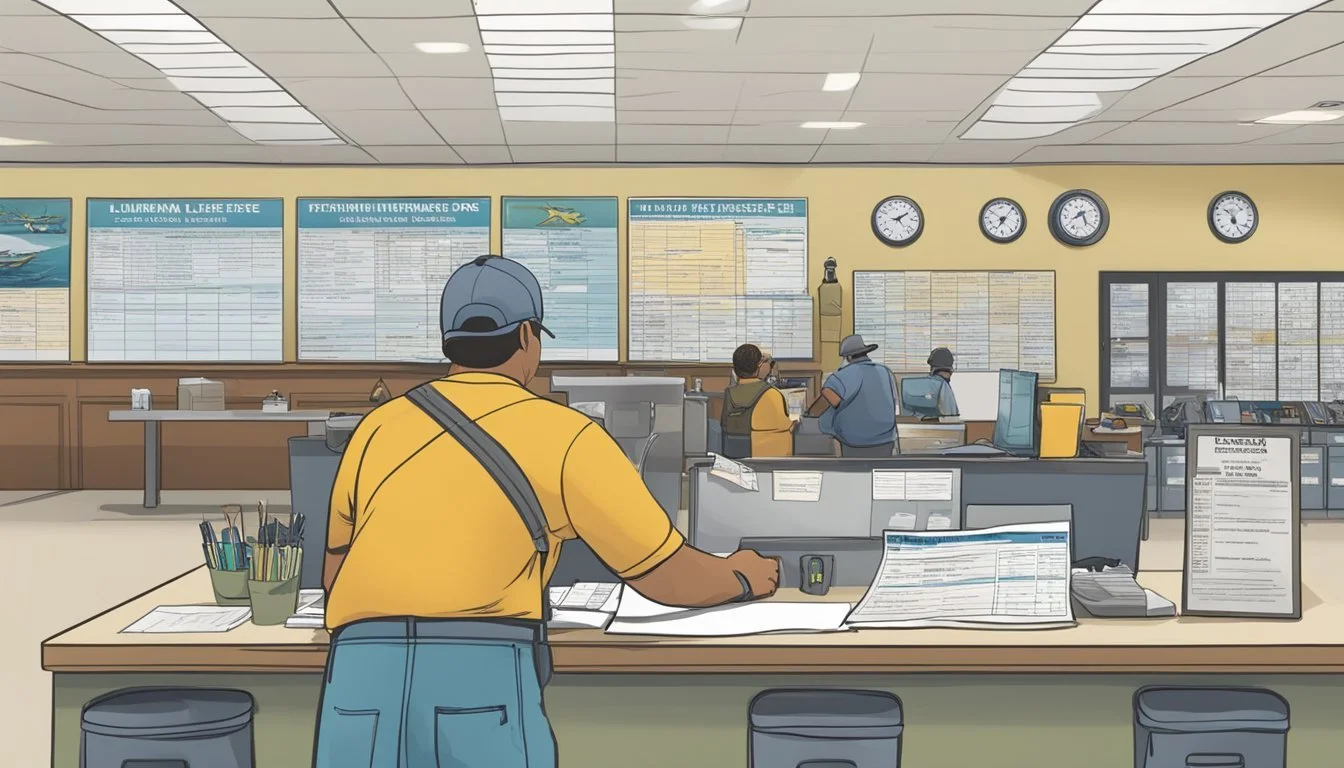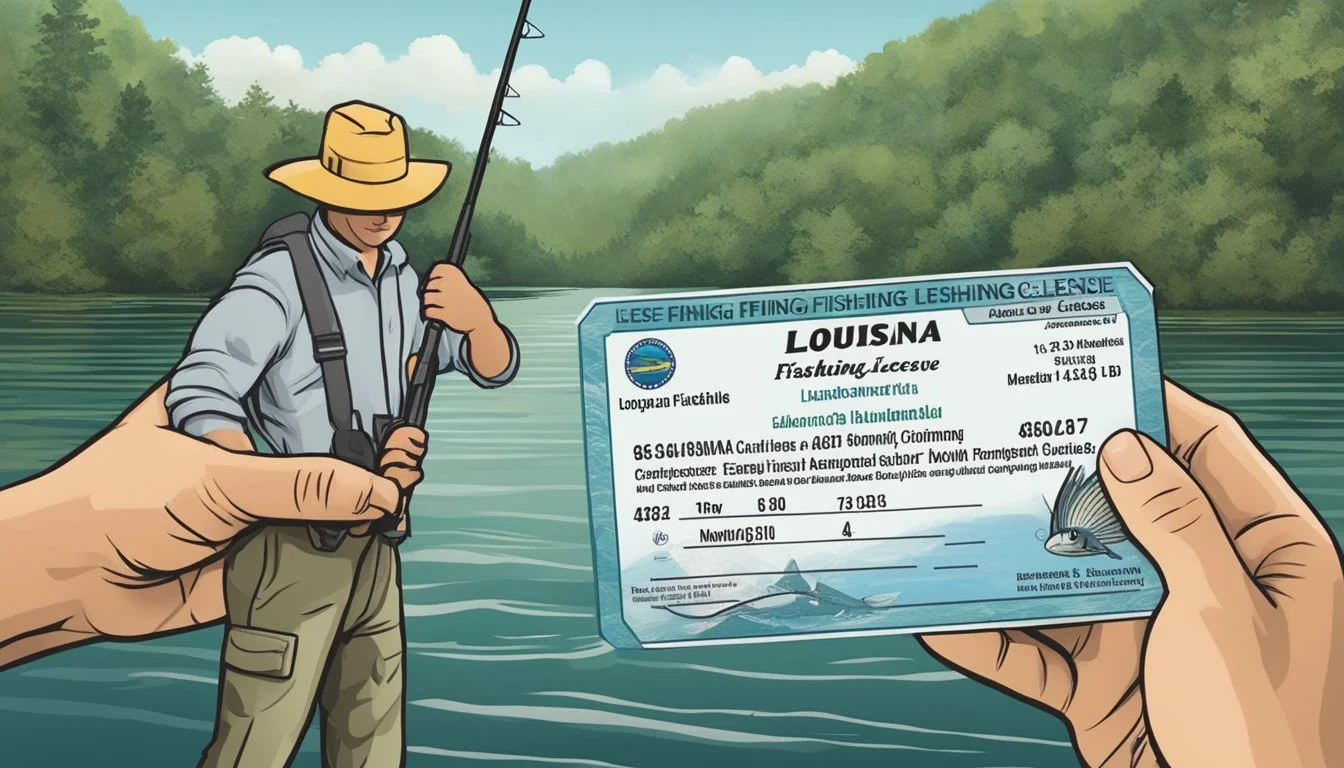How to Get a Louisiana Freshwater Fishing License
A Step-by-Step Guide
Obtaining a Louisiana fishing license is a straightforward process designed to ensure that all anglers fishing in the state's freshwater bodies are doing so legally and responsibly. In Louisiana, anyone aged 18 or older is required to possess a Basic Fishing License for recreational freshwater fishing. This initiative supports the conservation efforts necessary to maintain the state's aquatic ecosystems and provides the resources needed for their ongoing management and protection.
The Basic Fishing License includes the usage of various fishing gear, such as bows and arrows, spears, frog gigs, scuba gear, hook and line setups, as well as cast nets with a radius no longer than 8 feet, 6 inches. This permits anglers to enjoy the diverse fishing experiences that Louisiana's waterways, famed for their abundance of freshwater species, have to offer. Special provisions are also made for Louisiana residents aged 60 or older who must obtain a Senior Hunting/Fishing License to partake in these activities.
When fishing in Louisiana, it's essential for anglers to carry their license with them, as it may be checked by wildlife enforcement agents. The licensing process is facilitated by the Louisiana Department of Wildlife and Fisheries, through which licenses can be purchased directly, ensuring that all fishermen are equipped with the necessary documentation to fish (What wine goes well with fish?) legally within the state.
Understanding the Types of Fishing Licenses
Louisiana offers a range of fishing licenses to accommodate the diverse angling activities in its waters. These licenses vary by the type of water body—freshwater or saltwater—and the demographic eligibility of the angler.
Freshwater Versus Saltwater Licenses
Both freshwater licenses and saltwater licenses are necessary in Louisiana, depending on where one chooses to fish. A Basic Fishing License allows fishing in inland waters, while to fish in coastal areas, one needs a separate Saltwater License. The boundary demarcating these zones is commonly known as the "saltwater line."
Basic Fishing License
The Basic Fishing License is a requirement for anglers in Louisiana to fish in freshwater bodies.
For residents, the annual fee is $17.
Non-residents pay $68 for their annual license.
Lifetime Licenses
Lifetime licenses are available in Louisiana and serve as a one-time purchase granting the holder fishing privileges for their lifetime. These are priced at $500 for both freshwater and saltwater fishing.
Special Licenses for Seniors, Veterans, and People with Disabilities
Louisiana provides special licensing options for various groups:
Seniors (age 60 and over) can obtain a Senior Hunt/Fish License, which gives them the right to fish in both freshwater and saltwater.
Veterans are eligible for discounted licenses, recognizing their service.
People with Disabilities can apply for specific licenses tailored to their needs, ensuring equal access to fishing opportunities.
Louisiana's fishing licenses cater to a wide audience, allowing everyone from the avid fisher to the occasional hobbyist to enjoy the "Sportsman's Paradise" legally and sustainably.
Eligibility Requirements
Obtaining a freshwater fishing license in Louisiana is a straightforward process, but it's important to understand the criteria for eligibility, which mainly revolves around residency, age, and certain special considerations.
Residency and Age Factors
Residents of Louisiana must provide proof of residency to qualify for a resident fishing license. This typically means presenting a valid Louisiana driver's license. A bona fide resident is someone who has resided in the state for at least 12 consecutive months prior to the license application. As for age requirements, individuals aged 18 and over are required to have a Basic Fishing License to fish in freshwater.
Proof of Residency: Valid Louisiana driver's license
Age Requirement: 18 years or older for Basic Fishing License
Special Considerations for Military, Students, and Non-Residents
Certain groups receive special consideration when applying for a fishing license in Louisiana:
Military: Active-duty military personnel stationed in Louisiana and their dependents are eligible for resident licenses. Veterans may also be eligible for additional benefits or exceptions.
Students: Full-time students at Louisiana educational institutions are considered residents for licensing purposes, even if their permanent home is out-of-state.
Non-Residents: Non-residents must obtain a non-resident license but can do so if they meet the state's requirements. Their home state's reciprocity with Louisiana may affect licensing options and fees.
Special Groups:
Active-duty military and dependents: Eligible for resident licenses
Full-time students: Considered residents for licensing
Non-resident anglers: Required to have a non-resident license
How to Purchase a Louisiana Fishing License
Securing a Louisiana fishing license is a straightforward process that can be completed online, at retail locations, or by phone. Anglers have the flexibility to choose the purchasing method that best fits their schedule and preference.
Online Options
Those who prefer the convenience of the internet can purchase a recreational fishing license via the official Louisiana Department of Wildlife and Fisheries website at www.wlf.la.gov. The site is accessible from any mobile device or computer, making it easy to buy a license at any time. To complete the online transaction, users will need a Visa, MasterCard, or Discover credit card.
Retail Purchase Locations
Anglers can also opt to buy their fishing license in person at various retail vendors. Notable locations include Walmart stores throughout Louisiana, where licenses can be obtained over the counter. This option may be preferable for those who wish to make an immediate purchase or seek assistance from store personnel.
By Phone
Alternatively, licenses can be acquired by calling the Louisiana Department of Wildlife and Fisheries at 225-765-2887. This method is convenient for those who may not have internet access or prefer speaking to a representative. Phone purchases also require a Visa, MasterCard, or Discover credit card.
Prices and Fees for Licenses
When considering a freshwater fishing license in Louisiana, prospective anglers should be aware of the distinct pricing structures in place for residents and non-residents, as well as additional costs for any necessary permits and stamps.
Resident Versus Non-resident Rates
Residents of Louisiana benefit from reduced fees for fishing licenses compared to non-residents. Here are specifics:
Basic Fishing License (Annual):
Resident: $17
Non-resident: $60
The Recreational Offshore Landing Permit (ROLP), required for certain offshore fish species, is free for both residents and non-residents. However, an individual must hold a Basic Fishing License to obtain the ROLP.
Additional Permits and Stamps Costs
While the Basic Fishing License covers freshwater fishing with all legal recreational freshwater gear, anglers may need additional permits or stamps for certain activities or areas:
Saltwater License (if fishing in saltwater as well; Basic Fishing License required):
Resident: $15
Non-resident: $30
Hook and Line (Cane Pole) License:
Resident: $5
Non-resident: Not required if possessing a Basic Fishing License
For those looking to fish on public oyster seed grounds or engage in alternative oyster culture, further licensing and associated fees apply, with different rates for gear and permits required for harvesting oysters (What wine goes well with oysters?). Fees generally increase for non-residents and commercial entities.
Regulations and Compliance
In Louisiana, the angler's compliance with state freshwater fishing regulations ensures sustainable and responsible fisheries management. Adherence to gear restrictions, legal means of capture, size limits, and seasonal guidelines are essential components to maintaining a healthy aquatic ecosystem.
Understanding Gear Restrictions and Seasons
Gear restrictions in Louisiana are set to protect fish populations and habitat. Anglers must use only approved recreational gear such as:
Pole and Line: With or without a reel, using natural or synthetic bait.
Hook and Line: Must adhere to bait restrictions.
Bow and Arrow: For certain species.
Barbed or Barbless Spear: For specific fishing activities.
Frog Gig/Catcher: Used for capturing frogs.
Scuba Gear: In conjunction with other legal gear for fishing.
Cast Net: Radius not exceeding 8 feet, 6 inches.
Yo-yos: or trigger devices.
Slat Traps: According to regulations.
Seasons are established to protect fish during critical periods such as spawning. Anglers should consult the Louisiana Department of Wildlife and Fisheries to stay informed about seasonal fishing dates and closures which may affect when certain species can be legally captured.
Legal Means/Gear and Size Regulations
Louisiana mandates that fish be captured by legal means and gear to ensure fair chase and conservation. Here is an essential list of what anglers should know:
Legal Gear Usage Conditions Hook and Line Must comply with bait and gear restrictions. Bow and Arrow/Spear Only certain species may be taken. Frog Gig/Catcher Allowed for frogging seasons. Scuba Gear Combined with other legal fishing methods. Cast Nets Limited to a radius no larger than 8 feet, 6 inches. Traps and Trigger Devices Must follow specific guidelines for each device type.
In addition to using approved gear, anglers must observe size regulations for different species. These regulations control the minimum or maximum size of fish that can be kept, ensuring that juvenile fish have the chance to mature and reproduce, contributing to the long-term health of the species. Size limits vary by species and sometimes by location, so it’s critical for anglers to consult the latest guidelines.
Additional Resources and Contact Information
When seeking information on obtaining a Louisiana freshwater fishing license, individuals have access to a comprehensive array of resources and support services. The Louisiana Department of Wildlife and Fisheries (LDWF) provides an informative website and customer service options that cater to the needs of anglarians at every experience level.
Frequently Asked Questions Portal
The LDWF website offers a Frequently Asked Questions (FAQ) portal which serves as the first stop for anglers looking for quick answers. This section includes information related to licensing, regulations, and various fishing activities in Louisiana state waters.
Customer Service and In-Person Support
For personalized support, the LDWF offers multiple contact methods:
Email: Anglers can contact the LDWF directly for detailed inquiries and assistance via email.
Baton Rouge Office: The LDWF's main office in Baton Rouge is available for in-person visits. Individuals can obtain licenses and gain valuable information directly from LDWF officials.
Method of Contact Details LDWF Website Accessible 24/7 for information and online license purchases Customer Service Line 1-800-256-2749 for license and regulation queries Baton Rouge Office Address 2000 Quail (What wine goes well with quail?) Drive
Baton Rouge, LA 70808
Anglers should refer to the official LDWF website or the Baton Rouge office for the most current and accurate information regarding freshwater fishing licenses.
Benefits of Holding a Louisiana Fishing License
By obtaining a Louisiana fishing license, anglers contribute to critical conservation efforts and gain access to a diverse range of freshwater and saltwater fish species.
Conservation and Habitat Support
Every Louisiana fishing license sale directly funds wildlife conservation and habitat preservation initiatives. The resources generated are allocated for the management of freshwater and saltwater ecosystems, helping maintain the natural balance and ensuring the sustainability of recreational fishing areas. License fees support habitat restoration projects, improve water quality, and underpin scientific research that fosters freshwater species and their environments.
Access to Abundant Freshwater and Saltwater Species
Holders of a Louisiana fishing license enjoy the privilege of engaging in freshwater fishing and saltwater fishing across the state's diverse aquatic landscapes. Louisiana's waters are teeming with a multitude of game fish species, including but not limited to largemouth bass, catfish, redfish, and speckled trout, enriching the recreational fishing experience. The license serves as a gateway to arguably some of the best fishing spots in the United States, ensuring both plentiful catches and memorable fishing adventures.
Special Fishing Events and Opportunities
Louisiana offers unique events and opportunities that allow anglers to enjoy the state's rich fishing resources. These include special periods where licenses are not required and competitive events that showcase the best of freshwater fishing.
Free Fishing Weekend
Louisiana's Free Fishing Weekend is an annual event where residents and non-residents alike can fish without a license in public waters. This weekend typically occurs in early June, providing a perfect opportunity for those new to the hobby to experience fishing, or for seasoned anglers to introduce the sport to friends and family.
Fishing Tournaments and Records
Louisiana is home to multiple fishing tournaments throughout the year. These events attract both amateur and professional anglers aiming to catch various species and vie for records. Tournaments may focus on specific fish, such as bass, or offer categories for the largest catch.
Bass Fishing Tournaments: Often held in lakes voted as top bass fishing destinations, these competitions can provide both excitement and community engagement.
Record-Achieving Opportunities: Anglers looking to make their mark on the sport can participate in events that could lead to state or even national records.








